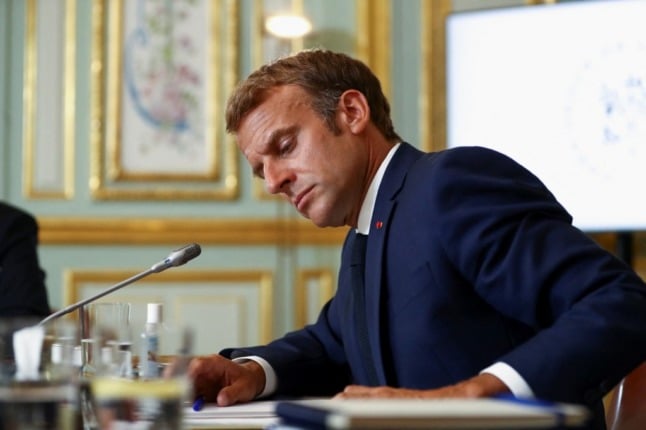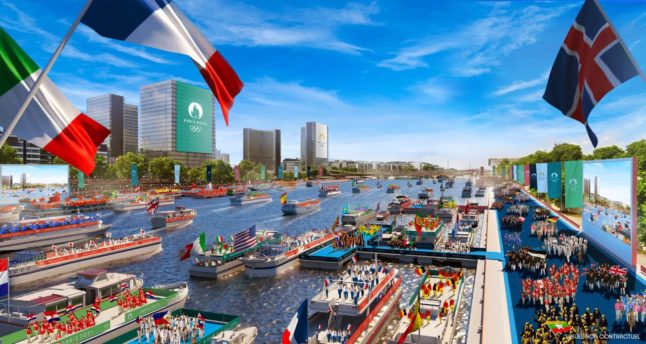Jean-Frédéric Poisson is running for President of the Republic. So is Jacline Mouraud. So are Antoine Martinez and Anasse Kazib.
Never heard of any of them? Don’t worry. Neither has the immense majority of French people. With just over seven months to go before the first round of the presidential election, the jostling crowd of would-be heads-of-state is growing larger. Witty, random people have started to post tweets to announce to the French nation that they have decided, after deep and lengthy reflection, NOT to run.
There are over 30 declared or likely-to-declare runners at present. Only a dozen or so of them will gather the 500 endorsements of mayors or other elected officials that they need to make the first-round ballot paper on April 10th.
READ ALO Five minutes to understand how French presidential elections work
Only four of them, by my reckoning, have any serious chance of reaching the two-candidate second round on April 24th.
They are President Emmanuel Macron (who has not yet declared), the far-right leader Marine Le Pen and two leading, rival and potentially mutually-destroying candidates of the centre-right, Xavier Bertrand and Valérie Pécresse.
What? No one with any chance of reaching the second round from the Left?
According to all opinion polls, the broad Left, including the Greens, will attract 30 percent of the popular vote in the first round – well above the likely 22 percent or so of votes needed to go forward to the two-candidate second round run-off. This vote looks certain, however, to be scattered over eight different candidates: a Green, two Socialists, the hard-left leader, Jean-Luc Mélenchon, a Communist and three rival brands of Trotskyists.
Well done, La Gauche. You can always complain afterwards that the result is undemocratic and does not represent the will of the people.
A brief effort was made to consider ways of choosing a broad candidate of the Left who would have a chance of reaching Round Two. Ideological and egotistical barriers made discussion impossible, let alone agreement.
Only the vain Mélenchon on the Left believes in a victory of the Left in 2022. The others – including most likely Anne Hidalgo, the mayor of Paris for the once-presidentiable Socialists – are running essentially for self-promotion or to keep their party brand alive in the hope of better years to come. I would put Hidalgo in the second, party-serving rather than self-serving, category.
The Green “primary” this month, with five candidates in the field, is a mixture of brand-promotion and self-promotion. The front-runners are the Euro MP Yaddick Jadot and the mayor of Grenoble Eric Piolle. Neither is likely to score more than 8 percent in the first-round proper in April.
Here, then, is the first lesson of French presidential politics. Many of the candidates are either delusional or are running with wider or longer-term political aims in mind.
Into which category should we place Eric Zemmour, the leader of the French Taliban (political non-violent branch)?
Or Michel Barnier, the former EU Brexit negotiator, whose candidature has caused immense excitement? Unfortunately for Barnier, the excitement is not in France but in Britain.
Zemmour, in case you somehow managed to miss him, is a far-right TV pundit, columnist and writer. He, like the Taliban in Afghanistan, wants to return to an older, purer, inward-looking, male-dominated country, unsullied by foreigners or the 21st century (or much of the 20th after the fall of the Vichy regime in 1944).
He believes that Marine Le Pen, leader of the far right Rassemblement National, has gone soft and can never be elected. He has not yet declared but seems certain to do so. Polls give him 5 to 7 percent of the first round vote.
I believe that Zemmour’s probable candidature falls into the category of tactical rather than delusional. It’s a dry run for 2027, intended to destroy Le Pen and Lepennism and prepare the ground for a more plausible candidate – possibly Marion Maréchal, Le Pen’s niece – who might unite the Far Right and Centre Right.
Barnier’s run – properly-speaking an entry in a centre-right primary which does not yet exist – is also tactical. He knows he cannot win. The outpouring of bile against him in the right-wing UK media in recent days has not been matched by an outpouring of affection in France. At the age of 70, Mr Barnier is, I believe, running for a senior job in a future centre-right government.
It’s quite possible that President Macron, if re-elected, will have to govern next time in an alliance or co-habitation with the centre-right. I suspect that Barnier fancies himself as foreign minister again.
What of the other centre-right hopefuls? After a flurry of candidatures and withdrawals in recent days, the field has narrowed down to only two serious centre-right runners and a handful of vanity-delusional candidates.
The serious runners are Xavier Bertrand, the president of the northern region, Hauts-de-France, and Valérie Pécresse, president of the greater Paris region, Île-de-France.
Bertrand, like a breakaway cyclist in the Tour de France, declared early six months ago in the hope of shaking off “le peloton” of other centre-right wannabes and avoiding a primary. That strategy has not worked. He is still refusing to go into a primary.
The main centre-right party, Les Républicains, may or may not have a primary in October or November. If they do, Pécresse, in the absence of Bertrand, will win. In the meantime, the party has just launched a giant opinion poll of 15,000 sympathisers in the hope of avoiding having a primary at all.
Bertrand, unless he comes top, will reject the mega-poll. In other words, there is still a strong chance that the centre-right will have two candidates – Bertrand and Pécresse – in the first round on April 10th. This would be like entering two candidates for a three-legged race in a 100 metres sprint.
If that can be avoided, Bertrand or Pécresse might yet challenge the Macron-Le Pen duopoly. If not, the second round of the 2022 presidential election will be a re-run of the second round of the 2017 election.
Macron would then win again? Probably.



 Please whitelist us to continue reading.
Please whitelist us to continue reading.
informative and amusing, merci